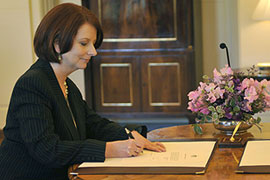Australia PM Rudd ousted by deputy
Julia Gillard engineers Labor party revolt to become country’s first female prime minister.

‘Went off track’
“It’s with the greatest humility, resolve and enthusiasm that I sought the endorsement of my colleagues,” she added.
|
“I asked my colleagues to make a leadership change because I believed that a good government was losing its way. I was not going to sit idly by” Julia Gillard, |
Since Labor is the majority party in parliament, Gillard’s swearing in as prime minister was a formality after securing the party leadership.
Wayne Swan was elected – also unopposed – as Gillard’s deputy and retains his portfolio as treasurer. He will to fly to Canada on Friday for a summit of Group of 20 major economies in Rudd’s place.
Gillard has yet to announce any other ministers in her new cabinet.
While offering some praise for the man she ousted, Gillard said the government he led “at times … went off track”, though she admitted she bore a “fair share of responsibility for the Rudd government’s record”.
She also acknowledged she had “not been elected prime minister by the Australian people” and would “in the coming months… ask the governor-general to call a general election so Australians can exercise their birthright and choose their prime minister”.
The governor-general is the representative of Britain’s Queen Elizabeth II, also the queen of Australia, and performs official functions such as swearing in the government and calling elections.
Policy changes
Gillard distanced herself from the Rudd government on a number of key policy areas on Thursday, pledging to resurrect the government’s failed climate change policy focussed on a carbon trade emissions scheme.
| in depth | |||||||
|
“If elected as prime minister I will re-prosecute the case for a carbon price at home and abroad. I will do that as global economic conditions improve and our economy continues to strengthen,” she said.
She also immediately offered to open negotiations with the booming mining industry over a controversial “super profits” resources tax.
A bitter public relations fight between the industry and the government in recent weeks contributed to the downfall of Rudd, who had refused to negotiate on his proposal to put a 40 per cent tax on mining companies from 2012, designed to take a greater share of revenue from the China-fuelled resources boom.
Gillard said in her first news conference after ousting her boss that she was “opening the government’s door to the mining industry and I ask in return that the mining industry open its mind”.
She urged the mining industry to call off its well-funded campaign against the tax “as a show of good faith and mutual respect” and said the government would, in return, withdraw its own TV advertisements.
Rudd exit
An emotional Rudd, flanked by his wife and three children, gave his final speech in the prime minister’s courtyard at Parliament House on Thursday.
“I have given my absolute all. I was elected by the Australian people as the prime minister … to bring back a fair go for all Australians,” said Rudd, choking bad tears.
The Labor hero, who led the party to victory at 2007 elections after 11 years in opposition, had ridden high in opinion polls as one of the most popular Australian prime ministers of modern times until he made major policy reversals, including shelving plans to make Australia’s worst polluters pay for their carbon emissions.
 |
| Gillard sought to distance herself from Rudd as she took over as PM [AFP] |
He has now become the shortest-serving Australian prime minister since 1972.
Rudd said he would contest the next election and continue to serve his party, and rated keeping Australia out of recession at the top of his list of achievements during his short tenure.
Despite Australia’s weathering the global downturn, however, recent polling puts the centre-left government neck-and-neck with the conservative opposition.
One poll earlier this month showed Labor trailing the opposition for the first time in more than four years.
Government legislators believe Gillard has a better chance of winning back voters ahead of elections because she is a warmer personality who can sell policies more effectively.
Gillard is expected to automatically attract a large female vote, especially when compared with conservative opposition leader Tony Abbott, who is anti-abortion and opposes sex before marriage.
A recent opinion poll indicated female voters would ditch Abbott for Gillard, favouring the female leader by a commanding 53 per cent to 23 per cent for Abbott.
Gillard said on Thursday that she was “well aware that I am the first woman to serve in this role, but can I say to you I didn’t set out to crash my head on any glass ceilings”.
